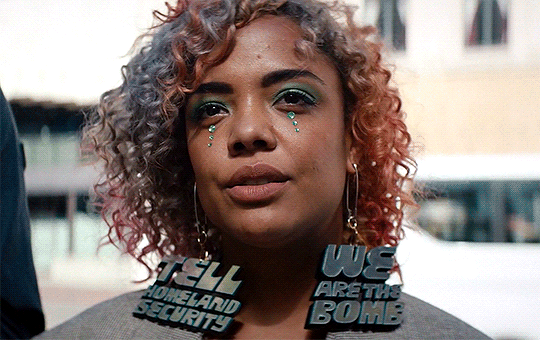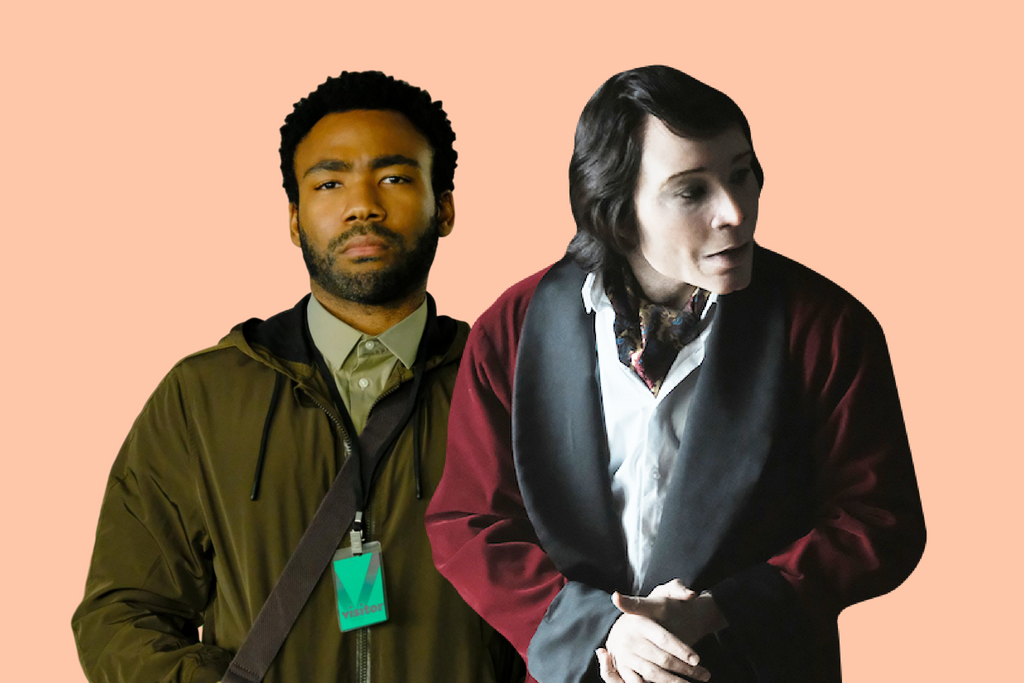We Talked To Boots Riley About Making 2018’s Strangest Film, ‘Sorry To Bother You’
"One thing you won't hear from people is that they were bored, right?"

Boots Riley and I are supposed to have a quick 15 minute chat, but that doesn’t happen. We’re almost at time when I squeeze in a question about his debut film, the blistering satire Sorry To Bother You — and Riley really runs with it, doubling our time on the phone.
Specifically, I’ve asked about Sorry To Bother You‘s soundtrack, composed by Merrill Garbus. Better known as tUnE-yArDs, Garbus’ recent songs like ‘Colonizer’ question her right to make money off Caribbean and African soundscapes.
Given that Sorry To Bother You, at its log-line, is about a black telemarketer who realises he can make more sales by using a (overdubbed) ‘white voice’, Garbus’ distinct vocal-loops throughout bring in the other side of the equation. Is Garbus’ inclusion on that some sort of pointed refraction?
The short answer is no (“Well, she [also] lives in Oakland…”). The long answer is more complicated, a 10-minute tracing of love and theft that covers George Clinton, Talking Heads, MGMT and The Beastie Boys, though Riley’s less interested in calling out appropriation than its driving forces.
“If you went in a time machine and played [‘black music’] for black folk 60 years ago, they’d would be like ‘that’s some white shit’,” he says. “The chords that are being used, all of that stuff, it’s bouncing off of each other. The question has to do with power.”
Across our chat, Riley’s answers wrap their way around my questions, redirecting them to constrict the chances of being misunderstood. Where most artists might be merely worried about their image or sales, Riley has been continually committed to one overarching cause — the end of capitalist exploitation — since joining Oakland’s labour movements as a teenager.
And in 1991, he co-founded Oakland marxist hip-hop group The Coup. ‘Not Yet Free’, a highlight of their 1993 debut album Kill My Landlord, spells out the group’s mantra: “Capitalism is like a spider, the web is getting tighter/ I’m struggling like a fighter.”
Over the past two decades, Riley has not only rapped about the oppressive forces of the police state, imperialism and racism, but actively worked against them, becoming a well-known face in Oakland through organising direct actions for union issues, housing and wealth distribution. As we chat, he’s driving around the city: he apologises as he continually says hello to people and gets briefly stuck into conversations, before coming back to our own. Because now, with Sorry To Bother You, Riley has a much bigger opportunity, one worked towards slowly.
Written in 2012 (and accompanied with a The Coup album of the same name), Riley has hustled hard to get the film made, using almost every connection he had to get the script into the right hands. Those hands were novelist Dave Eggers’, who published the screenplay via McSweeneys in 2014.
After that boost, he hustled more: now, the film’s being celebrated as one of 2018’s sharpest satires. Not to mention, it’s a rare beast — an unapologetically anti-capitalist film coming from inside the machine (in Australia, Universal is distributing it). As Riley told The New York Times, art isn’t equal to direct action, but “it tills the soil and gets people ready”. Cold-calling rarely works.
Sorry To Bother You, But Do You Have A Moment To Overthrow Capitalism?
Loosely built off Riley’s own telemarketing history, Sorry To Bother You follows Cassius aka Cash (Atlanta‘s Lakeith Stanfield). He’s down-and-out at first, before he quickly climbs the telemarking ranks when an older black colleague (Danny Glover) tells him to use his ‘white voice’ (dubbed by David Cross) on the phone.
Soon, he’s scouted for a more ethically dubious but high-paid telemarketing gig for Worry Free, a manufacturing giant operating on indentured servitude sold as benevolence by a handsome, enigmatic leader (Armie Hammer).
No spoilers, but things soon spiral out of control — ‘crazy’ and ‘insane’ are among the words most commonly used in reviews, though that’s underselling it. You merely need to look at how tech-giants have swallowed Riley’s hometown of the Bay Area (and, soon, New York) to see that Sorry To Bother You is ridiculously not-so ridiculous.
Eggers says he loves its “dirty kind of surrealism”, how the crazy co-exists with the gritty realities of Oakland’s economic, racial and class divides. “Your dreams don’t have high production values! Your nightmares are rough,” he told the NYT.
It may describe the film’s feverish tone — and its sharp cuts and visual trickery, too — but Riley isn’t a fan of that quote.
“With the ‘not high production values’, I wouldn’t have called it that at all,” he told me. “[Eggers] hadn’t seen the movie yet at that time, which he had said to them. He just knew that I was doing it practically. Here’s the thing: quote un-quote ‘high production values’ means CGI, [and] that shit looks ugly. People put up with it because they have to. You can make a skyscraper get up, walk over and take a shit and it wouldn’t even be amazing.”
“You can make a skyscraper get up, walk over and take a shit and it wouldn’t even be amazing.”
He has a point. Throwing money around won’t make film magic by itself: for proof, look towards the cultural ambivalence surrounding Avatar‘s impending four (!?) sequels. Unlike Pandora, Sorry To Bother You might’ve been made on a tight budget, but its world feels decidedly lived-in.
From Cash’s compact garage-room to his cars’ broken windshield wipers controlled by string, we get a sense of scale for the ways the grind works away at people bit-by-bit, eroding them into vulnerable positions.
“I started off communicating to my department this idea of beautiful clutter,” he tells me. “So, I think that’s how you can describe this movie… I like the idea of this messiness of life. And to that extent, when people get budgets and things like that for art, sometimes they try to make it cleaner — they do that with music, too.
“You go to the studio, the top producer somewhere… they make it all sound clean and beach and that’s stupid. [Or] you look at the production design on different rooms and there’s the Hollywood version of a kid’s messy room, you know what I’m saying? But this real messiness in our lives that gets cut out — it’s something I wanted and is very related to the funkadelic.
“I don’t like any art where the only thing about it is that it has a different message. I’m not interested in making that kind of art. To me, all of the little details, the craziness, all of that stuff, comes from a certain place: ideologically, it’s built from the way it really is in the real world. It comes from a certain root, a problem, which is how the system of capitalism is made, is built, on exploitation. It comes from those things. For me, the art part of it is all of those little things, all those tiny details, all of that stuff.”
Which can make for an overwhelming watch. That’s the point.
“We tried to drive people up into a frenzy with it at certain points,” Riley tells me. “That’s very much, from a musical side, what I would do in a show: gauge ‘how long can I keep people in this building?’ ‘How can I set that up to here?’ ‘When do I need to give them a break?’
“One thing you won’t hear from people is that they were bored, right?”
‘There Is Nothing New About Silicon Valley’

Like Get Out (and, in one episode in particular, Atlanta) before it, Sorry To Bother You translates realities of being black in America into a social horror. But Riley is quick to shut down any calls that his film is a reaction to the Trump-era of open white supremacy.
After all, it was written in 2012 — he even took out lines about ‘Making America Great Again’ so people didn’t limit the film’s message to the current moment, or to the tech world.
“Here’s the thing,” he says. “People keep drawing a line to Silicon Valley, but I’m drawing a line to capitalism in general. I mean Silicon Valley is just the new bully in the street. There are parallels in mining industries, in early industrial industries — there is nothing new about Silicon Valley.
“Silicon Valley is just the new bully in the street.”
“My film is not a critique of the tech industry. My film is a critique of capitalism. And this same stuff has been tried for a long, long time.
“The way the tech industry leaders try to present themselves as cool, and new and innovative, that’s the same way, you know, a lot of these robber barons were presenting themselves. Right now, we look at the top hat and handlebar moustache as the sign of a villain, but back then it was the cool, sleek thing, right?
“And, you know, mining towns — all of these [ways in which] people get conscription is just how capitalism has worked. It goes in a spiral, so similar things happen.”
Still, there’s an undeniable brazenness to 2018’s powers, the way tech-giants can promote ethical services while openly underpaying and abusing workers. Sometimes, it feels easier to quell your outrage: what can you even do?
In Sorry To Bother You, characters struggle against the machine in a variety of ways. Cash shrugs off his job by saying he’s just looking after himself, while his girlfriend Detroit (Tessa Thompson) tries to change the world through art and Instagrammable earrings, and telemarketer Squeeze (Steven Yeun) prefers direct action.
Riley believes the latter is the only way out. In the meantime, he’ll keep tilling the soil.
Sorry To Bother You is in cinemas now.
Jared Richards is a staff writer at Junkee, and co-host of Sleepless In Sydney on FBi Radio. Follow him on Twitter.


